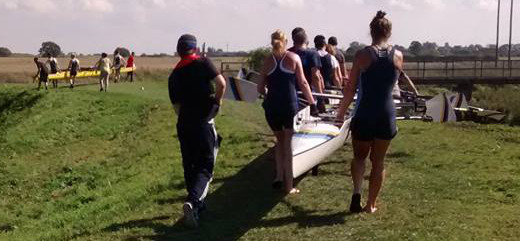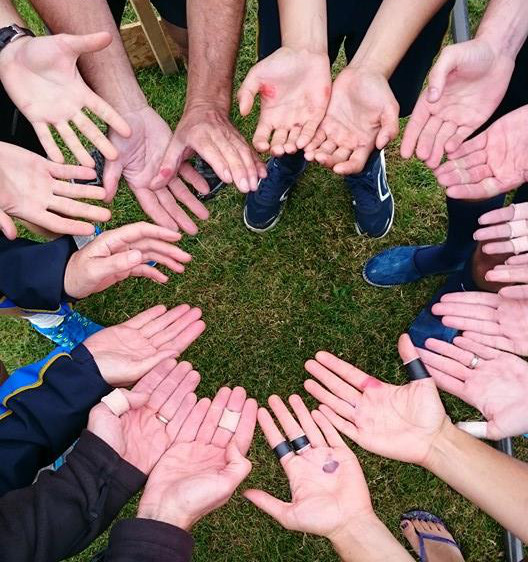See-also: the official club post.
General
Its an odd thing, but most even moderately fit people are able to finish Boston, including large numbers of people who would have no hope of finishing a running marathon (only 42 km) in a comparable time. To be able to focus on your actual rowing, and indeed enjoying it, pay attention to your hands and your arse - see sections below.
One general piece of advice: there is little spare time, especially if you're racing the course. Its easy to think that you'll have time to re-arrange your kit, or your plasters, or whatnot at Bardsey lock, but its not true. If there's no queue then you're onto the pontoon, hurried off it, hurried across, and hurried back onto the water as fast as possible.
The course
The course is 49 km (not 50. People get confused because the finish is at 50 km; but the start is at 1 km. Think about it). After 12.5 km there is Bardsey lock where you get out and hump the boat across; then there's another 36.5 km to go. There are a variety of bends along the way but basically that's it. The river is initially quite narrow - too narrow to overtake - but by the time you get anywhere near overtaking anyone, it widens out. It can be quite weedy; consider taking a "weed hook" to clear your fin.
 The "official" estimate of the time taken to get over Bardsey lock - for those interested in racing the course and trying to work out their needed splits - is 5 minutes. You'll be lucky to hit that. In 2013, when we thought we'd done it well, we took 6:30. Its generally considered best to leave your blades in, rather than taking them out: just push them diagonally across the saxboards, and "handbag" the boat. This also has the advantage that you don't need to take your kit out. There are people on hand to help.
The "official" estimate of the time taken to get over Bardsey lock - for those interested in racing the course and trying to work out their needed splits - is 5 minutes. You'll be lucky to hit that. In 2013, when we thought we'd done it well, we took 6:30. Its generally considered best to leave your blades in, rather than taking them out: just push them diagonally across the saxboards, and "handbag" the boat. This also has the advantage that you don't need to take your kit out. There are people on hand to help.As I said the start is quite narrow. Boats go off at minute intervals, and there's space for a bit more than one VIII's worth on the start stages (pic of the start). So if you're a scull you'll be hurried on and off, but you can sit in the river for a minute or so sorting yourself out. If you're an VIII there's no such space, and you may be obliged to actually start before you're really ready, and expected to sort yourself out while rowing in sixes after the start. This depends a bit on how busy the year is; 2015 seemed quite relaxed.
If you want a decent (i.e., not too early) start time, then consider carefully what category you're entering. Have a look at this year's draw for example. Remember, anyone allowed to enter novice is also allowed to enter IM3.

Hands fall apart
For me, this is the biggest problem, as it is for many people. Solutions:
1. tape / plaster up your hands. My pic shows an example. Often, a layer of padding with electrical tape on top to keep it in place works well.
2. Wear gloves. I've come to believe in this. Ignore the naysayers who'll tell you its not Manly. Gloves can usefully be combined with taping, and can help it not rub off.
3. New idea: tape up your blade handle. One of our ladies tried this and it seemed to work; we think she may have used "equestrian tape".
4. Endure the pain. Not my favourite option.

Arse on fire
Another excellent way to really not enjoy your row is to discover 20 km in that the seat isn't very comfortable and you've run out of ways to wriggle it better. Hopefully, you're rowing on a seat you know and love; but even so a seat pad is an excellent idea. Either a "real" one such as people sell, or a seat-shaped portion cut out of a carry may will do just as well. Opinions vary as to whether its best to pad from the start, or give yourself a treat half way in.
AOF is not obligatory. If your bum fits the seat (mine fits the J8 very well) you won't need one.
Food and drink
You want some. Opinions differ on exactly how much. I find a litre of water is enough; others want two. You're likely to end up stopping every 10 km, or somesuch, for water and a snack. If you're shaving every second, energy gels are faster than real food. Otherwise, the obvious: bananas, chocolate bars. Be aware that food that seems scrummy when you're relaxed can be hard to force down your throat in a hurry. It may be a good idea to plan the first snack at or around Bardsey: that way, if you have to wait for the pontoon, you can use the time usefully. If I was running, I'd take a gel every 5 km after the first 10 km; when sculling Boston, that's what I've done.
Transport
You wouldn't believe what a pain transport can be. The central problem is that your cars and trailers go to Lincoln, but you end up at Boston, 49 km away. The easiest solution is to get someone to drive your trailer for you. Do this if you possibly can. However, contrary to what I said in 2009, I think (indeed I found by experience) that sculling and driving your own car back is fine.
If you're an VIII, you have the option of pre-positioning some cars at the finish, at the cost of some to-and-fro-ing. Getting a lift back from the finish to the start with someone else can work; a shared taxi back is about £50, reasonable if shared with a few other people. My pet peeve is that the organisers could surely do more to help ease this process, but don't.
Getting to the start: pay close attention to the final stages. If you've from the South and following the "obvious" route you get diverted into the one-way system and if you're anything like me, you get lost. If you ask google maps carefully it will show you a different route round the north.
Du cote de chez Swann
I've done Boston more than once. If you want to read about it, try:
